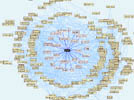Posted: June 20th, 2003 | No Comments »
I was obviously too busy to notice the launch by Sun Microsystems of java.net at JavaOne 2003. Java.net is a common area (aka a portal) for conversations and development projects related to Java and is organized by Sun’s engineers, researchers, technologists, and evangelists. It integrates stories, weblogs and wikis.
Posted: June 15th, 2003 | No Comments »
No dishing out cash and no carrying back four hot dogs and four sodas to your seat! In-seat ordering of food and drinks via web-enabled cell-phone is being tried out at Safeco Field (home of the Seattle Mariners). More: “Dialing for a dog and drink from the seats at Safeco Field“. Some non-nerdish minds oppose to this new way enjoying a baseball game “I would never use this. You’ve got to get up once in a while” 
Notice people working in professional sport franchises have titles like “vice-presidents of technology”. The Mariners also offer interactive games for some cell-phone users at Safeco.
Posted: June 13th, 2003 | No Comments »
Cultural competence is an important skill to prevent communication breakdown. Cultural competetence is about being adaptive and dealing with complexity. It is the ability to switch between cultural paradigms. As read in Business Week, for communication, managers are encouraged to demonstrate sensitivity to language and cultural communication requirements. It improves communication despite accent and language barries and minimizes misunderstandings of etiquette, values, and behaviors. For many people, one can define a “cultural orientation” that includes:
Cognitive Styles: how we organize and process information
Negotiation Strategies: what we accept as evidence
Value Systems: the basics for behavior
Culture is complex, but it “embodies a way of living, of seeing the world”. Each of us maintains our own “World View” around five key areas:
Human nature: what is the character fo human nature
Relationships: how do people establish relationships
Nature: what is the relationship of people to nature
Time: where is the temporal focus of life
Activity: how do people live their lives
We see readily how contrasts around time, language, communication, and relationship can have significant consequences in online communities.
Posted: June 13th, 2003 | No Comments »
L’utilisation des règles d’écriture de micro-document (par ex. SMS) dans des une communauté virtuelle (forums ou mailing-lists) semble s’étendre. Lu sur une mailing-list publique:
“s@lut, jvoulé savoir komen on pouvé fair epr ke l’em@il de l’auteur puisse etre directement modifié par l’auteur”.
Cet abus de l’écrit en phonétique dans une espace commun, m’a fait penser au texte dans Smarter, Simpler Social sur les possibilité de cassure dans une communauté pour des raisons linguistiques ou culturelles:
“Another goal for online social software, is to remove friction and break down barries to interaction so that people can communicate and collaborate more effectivily. An often overlooked aspect of this challenge is consideration of issues relating to languages, shared meaning, how we deal with communication breakdown and discover” [...] Cultures also differ in a multiple of other ways, for example, in how explicit they are about the existence of disputes or disagreement or how overt thery are about self-promotion. Given the limited bandwith of online communication techniques compared to the far richer face-to-face mode of interaction, failure to understand these subtleties can lead to communication breakdown, the descrution of social capital and ultimately the degeneration of online social netwok.“
Posted: June 11th, 2003 | 1 Comment »
It takes time to move to a fully digitalized world. Status on my paperless office: progress, not perfection… 

Posted: June 11th, 2003 | No Comments »
Bain de minuit aux Paquis à Genève.

Posted: June 11th, 2003 | 1 Comment »
Après l’Empire (Emmanuel Todd) p.48:
“Il faut, même si c’est difficile et paraître contredire l’évidence, accepter l’idée que les crises, les massacres que nous décrivent inlassablement les médias, ne sont pas, le plus souvent, des phénomènes siimplement régressifs mais des dérèglement transitoires, liés au processus même de modernisation. Et que, mécaniquement, une stabilisation doit succéder aux troubles, en l’absence de toute intervention extérieure.“
Posted: June 10th, 2003 | No Comments »
As read in the very good Smarter, Simpler Social:
“The behaviour of smart mobs, and in some respects online blogging communities, exhibit many of the features of what scientists call complex systems : they are emergent, highly connected with intricate inter-relationships, self-organising and simple on the micro level but create effects that appear complex and unpredictable on the macro level; plus, they tend to evolve through rapid collaboration or feedback loops. In the physical world, such systems (arguably human evolution is one example) are not necessarily the most efficient, but they are highly adaptive to changing conditions and they generally get the job done. Complexity theory has become a very popular way of thinking about the behaviour of biological, meteorological, financial, social and other systems, and it has helped us understand that apparently turbulent and chaotic systems actually have a tendency to create their own non-linear order.“
Posted: June 10th, 2003 | No Comments »
An analysis of internal e-mail exchanges maps companies informal structure. One can see who talks to whom and therefore know who holds the power. The map also shows the teams in which people actually work, as opposed to thoses they are assigned to and it highlights the communities of practice (informal collaborative netwoks).
More in the article “E-mail reveals real leaders“
Posted: June 7th, 2003 | No Comments »
A social network caught in the Web is reaserch paper on the study of a real world social network within a community web site. The authors studied the behavior and interactions (e.g. how personality and interests influence one’s choice of friends) among the members of the Club Nexus at Stanford University.
Small World Phenomenon:
In analyzing the social network we observered a small world effect, where the distance between any two users, measured in the number of hops along the Nexus Net, is only 4 on average. This average might at first seem low in view of the fact that Club Nexus represents a diverse group of users, both undergraduates and graduates at various stages in their studies representing many departments. The is the counterintuitive aspect of the small world phenomenon; individuals tend to socialize in smaller cliques, often determined by factors such as year in school, department or dorm, yet any two user are seperated by only a small number of hops.

Conclusion:
Our analysis was able to detect many expected trends (e.g. English majors liking to spend their free time reading or people sharing a narrow or unusual interested becoming friends), while at the same time finding non-obvious relationships (e.g. “responsible” people being perceived as slightly less “cool”). What makes Club Nexus special is that one is able to observe these patterns on a large scale with many different variables




